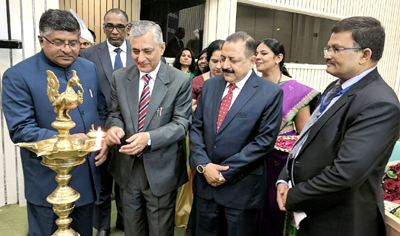
Excelsior Correspondent
NEW DELHI, Nov 26: Differences between judiciary and Government continued to be aired in the open with Chief Justice of India T S Thakur today saying, there is shortage of Judges in High Courts and tribunals as well as lack of perks and facilities for them,requiring Government intervention, a view Law Minister Ravi Shankar Prasad strongly disagreed with.
“500 judges posts are vacant in the High Courts. At present, there are several vacant courtrooms in India but no judges available”,said Justice Thakur.
Speaking at the inaugural session of All India Conference of Central Administrative Tribunal (CAT), attended among others by Union Law Minister Ravi Shankar Prasad and Union Minister in-charge of Department of Personnel & Training (DoPT) Dr Jitendra Singh, Justice Thakur said, since the Judges are not provided adequate facilities for working or residential bungalows, no retired Supreme Court Judge wants to head the Tribunal. He further warned that the situation will become more acute in times to come and there will be no Judges coming forward to head the Tribunals.
The Chief Justice alleged that the Tribunals “are not equipped and are lying empty and today a situation has come that no retired Supreme Court Judge wants to head the Tribunal. “I am pained to send my retired colleagues there”, he added.
Immediately countering the charge, Union Law Minister Ravi Shankar Prasad said, he “respectfully” disagreed with the Chief Justice because what he was saying is far from truth. Prasad claimed that over 120 appointments of judges were made in this year which was a higher number compared to the preceding years. “5,000 vacancies are there in the lower judiciary in which the government of India has no role to play and that is something only for the judiciary to take care,” he said.
Prasad said,”where the larger issue of appointment is concerned, there is a Supreme Court decision of making the Memorandum of Procedure (MoP) more transparent, objective, reasonable, fair and the Government stand is pending for the last more than three months and we are yet to hear from the Supreme Court” .
Law Minister also refuted Justice Thakur’s charge that the Judges retiring from High Courts were not being provided bungalows by the Government and said that because of the constraints of land and housing accommodation, this was not feasible. As for infrastructure, he said, this was an ongoing process and the Chief Justice could not blame the Modi Government which has done its best in just over two years since it has been in power.
Speaking on the occasion, Dr Jitendra Singh said that in the last two years, we in the Department of Personnel & Training (DoPT) have placed virtually everything in public domain and there was nothing much to seek information about through RTIs or other means. He said, if the role of CAT was to settle disputes and other issues in service matters, in last one year or so, we have made arrangements through mobile-based app whereby every Government official can access status of his empanelment, promotion, property returns, etc., with absolute transparency and this should reduce the conflict or dispute situation and further add to the ease of governance and at the same time lessen the burden on Tribunals like the CAT.
Dr Jitendra Singh disclosed that DoPT has taken up with the Union Law Ministry the issue of increasing the strength of Judges for Tribunals and will also approach the Union Ministry of Finance for an increase in funding. He said, we are open to inputs and suggestions from all quarters and hoped that the CAT will continue to live up to its avowed objective of dispensing justice for Government officials, so that they can avoid the harassment and wastage of time incurred in approaching the court for redressal of their service related grievances.
Meanwhile, he claimed that nearly 100% grievance disposal has been achieved through “Centralized Public Grievance Redress and Monitoring System” (CPGRAMS) in the Department of Administrative Reforms and Public Grievances (ARPG) under the Ministry of Personnel and this should also ultimately lessen the pendency of cases with CAT.
Justice Chelameswar, in his address, emphasized the need for precision and certainty while disposing of the cases.
Earlier, Chairman CAT Justice Permod Kohli welcomed the guests and gave a detailed resume of the working of CAT and also highlighted some of the demands for improving the functioning of the Tribunal.

